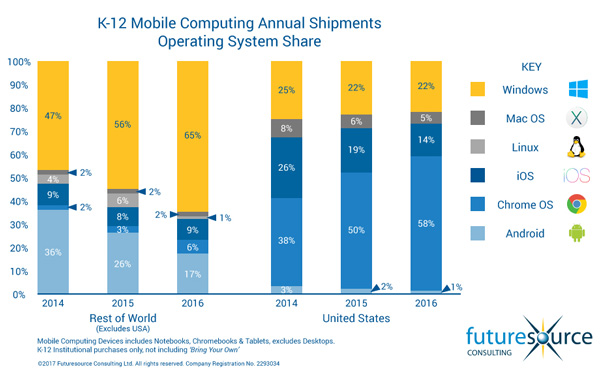Speaking with journalists at Mobile World Congress in Barcelona, Spain, Google’s Vice President of Hardware, Rick Osterloh, has confirmed that the successor of the company’s Pixel smarthones will be launching later this year, Android Pit reported Friday. Osterloh shot down reports calling for a budget Pixel edition, saying Pixels remain premium smartphones.
While Google showed no intent to abandon its premium smartphone brand, the company’s premium notebook bearing the Pixel brand has reached the “end of the line” status after shipping just two generations since 2013, according to Osterloh in a report by Frederic Lardinois for TechCrunch.
Google Pixel 2 due later this year
As per various leaks, the upcoming Pixel 2 smartphones may ship with a five-inch display running at 2K resolution, augmented by a new chipset from Qualcomm (possibly even Intel?) with six gigabytes of RAM to support Google’s second-generation virtual reality platform, dubbed Daydream.
Other rumored features include a USB-C port at the bottom, standard 3.5mm audio jack on the top and a new design involving a glass back panel with chamfered edges, center-aligned camera module and a fingerprint sensor.
Pixel 2 renders leaked via Chinese website Anzhuo.
“There is an annual rhythm in the industry. So, you can count on us to follow it,” said Osterloh. Contrary to past rumors, Google has no intentions of launching a budget Pixel edition as Osterloh confirms that next-generation Pixel smartphones will stick to their premium segment branding.
He wouldn’t say whether Google partnered with a third-party vendor on the next Pixel.
Water resistance, a feature missing from the original Pixel, should be added to a second-gen Pixel if Google is serious about keeping up with its high-end competition.
Chromebook Pixel reaches the end of the line
While the Pixel smartphone project wasn’t just a one-off experiment, Google’s Pixel notebooks will no longer be updated as the company has “no plans” to create future Pixel-branded notebooks. That piece of information was confirmed to TechCrunch’s Frederic Lardinois by Osterloh himself so it’s official.
Furthermore, Pixel notebooks that are already out in the market have totally sold out and Google has no plans to make any more of these, either, and they have been removed from sale from Google’s online store, too. Priced at $1,299, Pixel was always meant to be Google’s example of what a premium Chromebook could look like.
Outfitted with a touchscreen, Pixel notebooks ran Chrome OS.
A source told CNET that while there won’t be any more Pixel notebooks, it doesn’t mean Google “isn’t still interested in branded laptops and or convertibles.”
Osterloh clarified to CNET that “we don’t have any plans to discuss at this time.”
For the sake of completeness, I should mention that Google is thought to be folding Chrome OS and Android together into a new version of Chrome OS this year. It should be able to host Android apps, in addition to web apps running in the Chrome browser, and will allegedly run on PCs and give users access to Google’s Play Store.
FYI, Google’s Android-driven Pixel C tablet is still around.
Chrome OS gaining share in US K-12
Still, Osterloh said, “Google hasn’t backed away from laptops” entirely as Chrome OS remains “a huge initiative” in the company. Indeed, new data from Futuresource Consulting, as cited in The New York Times, showed that Apple’s iOS and macOS platforms both lost share to Chrome OS in the US K-12 education market last year.
Chrome OS is a version of Linux running the Chrome web browser.
While US K-12 shipments overall grew 18 percent annually to 12.6 million units, Apple’s iOS platform share in that sector dropped from nineteen percent in 2015 to fourteen percent in 2016. During the same period, macOS went from six to five percent share.
As for Chrome OS, the platform grew from fifty percent market share in 2015 to 58 percent in 2016. “We have the number two market share in the U.S. and U.K—but we have no plans for Google-branded laptops,” Osterloh said.
Apple has taken a beating mainly because Chrome OS notebooks are far cheaper than iPads or Macs. A typical Chromebook sells for under $300, with prices reaching as low as $120 on certain educational projects.
Subscribe to iDownloadBlog on YouTube
Furthermore, Google offers a comprehensive suite of cloud-based productivity tools via G-Suite that require little maintenance, in addition to easy integration with third-party platforms, task management via Google Classroom and simplified device management.
Apple also lacks 2-in-1 products that combine the defining features of the notebook and the tablet. Both Microsoft and Google and their respective partners have announced a wide range of 2-in-1 products designed specifically for education, priced below $300.
Source: Android Pit, TechCrunch
